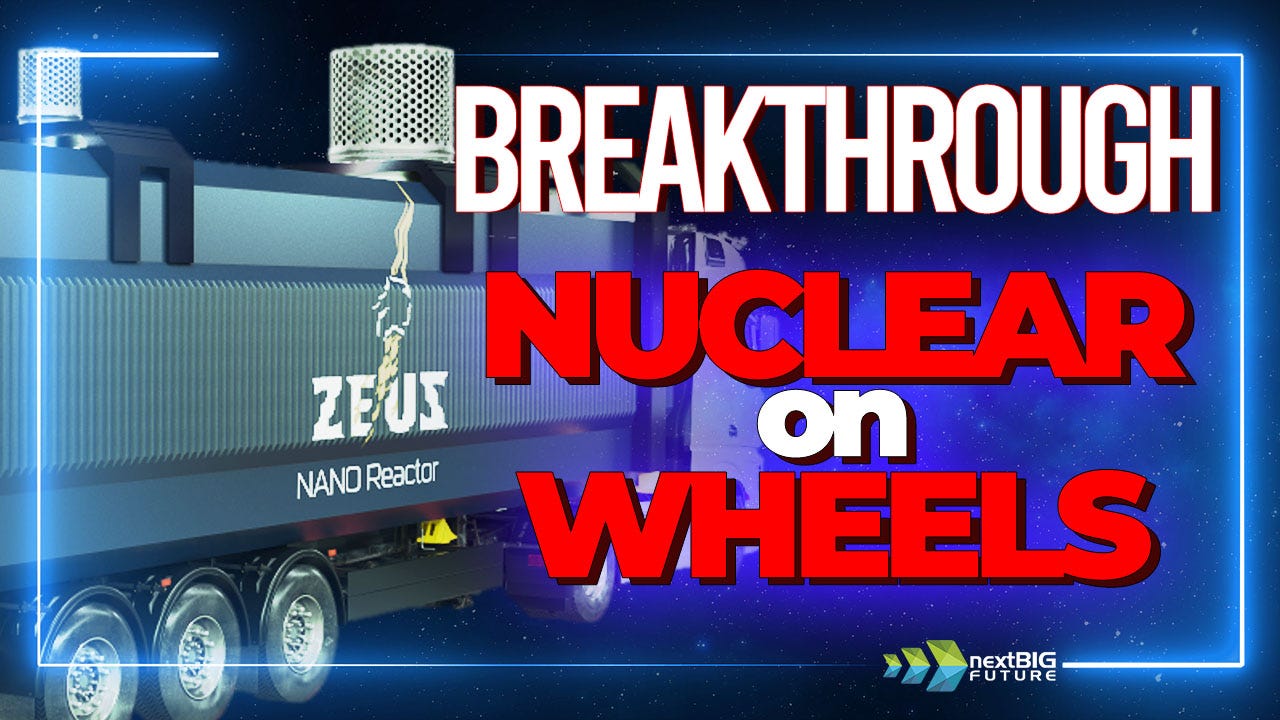BREAKTHRUGH Nanonuclear CEO Reveals Safe Nuclear Reactor on Wheels
Nanonuclear is vertically integrated microreactor and advanced nuclear technology company that raised $20 million on July 18, 2024 in a stock offering and had raised $8 million in earlier funding. Brian Wang of Nextbigfuture interviewed the CEO James Walker.
Mr. Walker is a Nuclear Physicist and was the project lead and manager for constructing the new Rolls-Royce Nuclear Chemical Plant; he was the UK Subject Matter Expert for the UK Nuclear Material Recovery Capabilities and was the technical project manager for constructing the UK reactor core manufacturing facilities. Mr. Walker was also seconded to Rolls Royce where he modeled configurations of RR’s Zero-Power reactor to inform confidence limits for the UK’s successor submarine’s mechanical design and worked for the Rolls-Royce Nuclear Thermal Hydraulics Engineering team investigating reactor channel thermal performance to inform new reactor designs and support the safety case for reactors in current class submarines. Mr. Walker’s professional engineering experience includes nuclear reactors, mines, submarines, chemical plants, factories, mine processing facilities, infrastructure, automotive machinery, and testing rigs.
They plan to sell 1,000 microreactors on a yearly basis for a trillion-dollar industry. Nuclear currently supplies some 18% of US power needs off 95GW of installed capacity, according to the Energy Information Agency (EIA). The Department of Energy (DoE) forecasts the country will need around 200GW of new nuclear capacity to reach net-zero by 2050.
Their initial reactors will nuclear fission reactors with 1-2 megawatts of power.
ZEUS which is a solid core battery reactor and ODIN, a low-pressure coolant reactor, each representing advanced developments in portable, on-demand capable.
The Zeus nuclear microreactor is engineered for safe operation in remote locations. Its ‘walk-away safe’ feature ensures stability and safety, minimizing risks in varied environments. This aspect is critical for ensuring consistent operation without the need for active intervention.
Portability and Adaptability: The modular components fit within standard shipping containers, facilitating transportation to remote sites. This feature enhances its utility in areas where traditional energy infrastructure is not feasible.
Zeus is tailored for locations where conventional power sources are impractical. Its design and functionality offer a reliable power supply, essential for operations in isolated regions. Zeus core is designed to provide constant power for at least 10 full power years.
The microreactor prototype is designed to harness thermal energy for direct heat applications or to convert it into electric power. This versatility allows for diverse applications, ranging from heating to electricity generation, meeting a wide array of energy needs.
Zeus employs conventional materials and multiple off the shelf components in order to minimize time to market and reduce cost. The prototype ensures the provision of reliable and clean electricity. Its design and operational efficiency make it suitable for commercial use, as well as for non-electric applications such as hydrogen fuel production, a growing area of interest in the renewable energy sector.
Nano Nuclear has just signed a Memorandum of Understanding (MOU) with Blockfusion Ventures, an affiliate of data center operator Blockfusion USA, Inc.
Under the MOU, NANO Nuclear will lead the technical assessment of advanced power supply systems for Blockfusion’s datacenter in Niagara Falls, NY. NANO Nuclear will explore the potential integration of its advanced microreactor technologies, evaluating compatibility between its microreactors’ electric output and the artificial intelligence (AI) datacenter’s energy requirements. NANO Nuclear will also assist Blockfusion in assessing the potential for other clean energy source alternatives like wind and solar. Additionally, considerations will be made in relation to environmental and regulatory constraints, as well as economic feasibility, alongside risk assessments. The MOU is non-binding and non-exclusive, but establishes a collaboration framework for a period of twenty-three months which could lead to the execution of definitive agreements in the future.Nano
Keep reading with a 7-day free trial
Subscribe to next BIG future to keep reading this post and get 7 days of free access to the full post archives.




